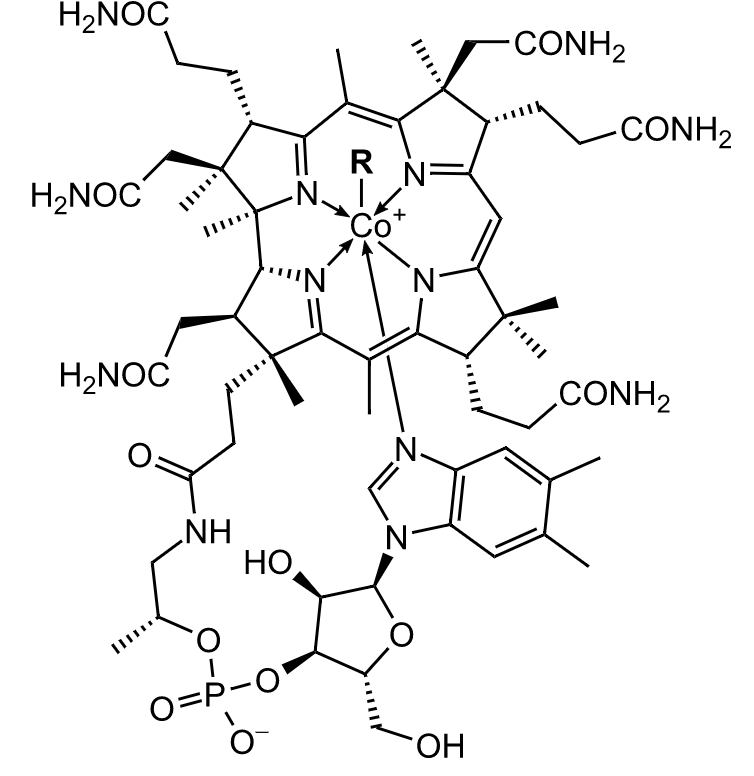Vitamin B12 for Pain

Most of my articles highlight the latest research. For this week, I wanted to talk about a topic that has research support but also mention my clinical experience. Having worked at a clinic focusing on multidisciplinary approaches to treating pain conditions, I had one tool that I applied hundreds of times that often showed significant benefits: vitamin B12.
Vitamin B12 is utilized in the body for methylation reactions. Methylation is the addition of a “methyl” group or a carbon with three hydrogens. Methylation is critical for myelin, the waxy substance that surrounds and protects your nerve cells. In order for myelin to stay healthy, it requires methylation. When a patient is deficient in vitamin B12 for long enough, nerve pain often develops due to damaged myelin from the loss of methylation reactions.
Vitamin B12 and Nerve Pain
Tabes Dorsalis
The research on vitamin B12 for treating pain has been around since the discovery of the vitamin itself. Early research explored its use for chronic syphilis pain, called tabes dorsalis. Reports describe B12 working better than almost any other treatment. The pain of tabes dorsalis can be excruciating with shooting pain that originates from damage to the spinal cord (Redmond 1957).
Diabetic Neuropathy
Diabetes often results in nerve damage or neuropathy. When high levels of sugar circulate in the bloodstream it can cause damage over the long-term, usually with loss of sensation and burning pain starting in the feet. Diabetic neuropathy can be severe and cause serious long-term challenges for patients.
For treatment, trials of oral B12 have shown improvements in diabetic neuropathy. Over the course of 1-4 months, taking B12 has shown to reduce pain between 30% and 70% depending on the clinical trial (Yaqub 1992, Devathasan 1986, Shindo 1994).
Herpetic Neuralgia
Shingles is a common condition that occurs when the chickenpox virus reactivates after an infection in childhood. The nerves involved become inflamed which can lead to nerve damage. The condition often results in long-term nerve pain that can be debilitating. B12 injections just under the skin around the site of the nerve pain have been shown to decrease chronic shingles pain by 54% (Xu 2013),
Low Back Pain
In the research literature, B12 has been used to address chronic low back pain as well with some potentially promising results. Daily injections of B12 for 2 weeks resulted in an astonishing 82% reduction in back pain (Mauro 2000). A separate study using 3 injections per week found a 31% reduction of pain in 2 weeks (Chiu 2011). With how common and disabling back pain can be, these clinical trials are in desperate need of repetition to confirm the benefits.
Personal Experience
While the research is still preliminary, we need more studies to fully flesh out the effects and best treatment parameters. However, when I was working at the pain clinic, B12 was often my treatment of choice for patients struggling with nerve pain. While not every patient responded, I did see patients reverse neuropathy symptoms and other types of pain. Typically, methylcobalamin, the active form of B12, is most recommended. Due to drug shortages at the time, we relied heavily upon standard cyanocobalamin and still saw significant clinical results.
For some patients, B12 allowed for a reduction in pain medication. A large percentage of patients, around half in my experience, also felt a significant boost of energy from the injections. When you consider the alternatives for treating pain, often opiates, the costs and safety of using vitamin B12 just made sense. While we had some exceptions, B12 generally wasn’t covered by insurance, since we weren’t treating laboratory diagnosed B12 deficiencies.

When treating patients with chronic pain, I definitely prefer injectable B12. With injections, we saw faster improvements compared to sublingual or oral formulations. While some people don’t like injections, cyanocobalamin and methylcobalamin done properly are usually close to painless. The commercially available hydroxocobalamin (another active form of B12) definitely stung more than the other two.
Conclusion
When working at the pain clinic, I gained a lot of experience in the use of vitamin B12 for the treatment of pain. While a promising treatment, it doesn’t work in all cases. Due to my experience I published a review on the research around using B12 for treating chronic pain which is available here. There’s more information in the review on the clinical trials and different mechanisms of action for B12. For now, it still remains one of my favorite approaches for helping patients with neuropathy.



